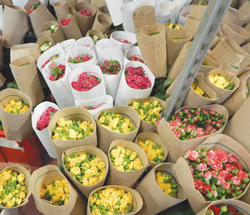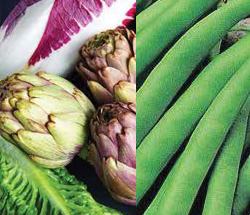 Sustainability & Market
Sustainability & Market
Astronomical air freight rates and space constraints in air cargo postpandemic continued to challenge the flower and perishables sector this year in Africa. Can infrastructure upgrades, collaboration, more air connections, cold storage facilities, government support, and new markets spell good tidings for the flower and fresh industry of Africa?
Kenya, Tanzania, South Africa, Ethiopia, and Ghana are some of the African nations that lead in both flowers, fruits and vegetables (perishables) supply to the world. The rapid development witnessed in these two sectors has driven domestic economic growth, grown investment and provided a plentitude of job opportunities to locals.
Even as the Coronavirus pandemic brought several challenges to the burgeoning flower and perishables industry, both these segments have been charting a revival in the backdrop of shifting economic developments in Europe, rising inflation, capacity constraints in air cargo, prohibitive air freight rates and travel restrictions in China.
Kenya and Ethiopia lead among other African nations like Zimbabwe, Rwanda, and Uganda in flower production and flower exports in Africa with Kenya contributing a lion’s share of 62% and Ethiopia at 24% in flower exports. Roses in the cut flowers category are grown in several African countries with Ethiopia, and East African nations like Kenya and Tanzania which lead in cut roses production and export. Flowers transported as belly cargo in passenger flights reportedly make up 40 % of the total freight transported by air. Kenya is the beating heart of the flower trade, as it supplies one-third of all the roses that are sold in the EU.
A recent study titled ‘Cut Flowers – Global Market Trajectory & Analytics’ by leading market research company Global Industry Analysts Inc. (GIA) cites, “Amid the Covid-19 crisis, the global market for ‘Cut Flowers’ estimated at $33.2 billion in the year 2022, is projected to reach a revised size of $40.7 billion by 2026, growing at a CAGR of 4.8% over the analysis period. Rose, one of the segments analysed in the report, is projected to grow at a 5.4% CAGR, while growth in the Chrysanthemum and Gerbera segment is readjusted to a revised 4.8% CAGR.”
Weakening Europe, the flower industry on ‘wait & watch’ mode
Despite such a fortuitous outlook for the upcoming years and a ‘peak season’ up ahead, growers and flower exporters are in a ‘wait and watch’ mode when it comes to demand and availability of cargo legroom for the produce.
Data gleaned from the Kenya National Bureau of Statistics indicates that the country exported approximately 210,000 tonnes of flowers worth $ 952 million in 2021. In fact, Kenya’s earnings from exports of cut flowers, fruits, and vegetables or horticulture reportedly rose 5% from 2021 from the previous year as per data from its statistics department. Ethiopian flower exports also accounted for 84 % of the total foreign currency the country generated from the horticulture sector over the last 10 months. It reportedly earned $421 million from flower exports in this period as per local news outlets.
While the EU and UK accounted for 70 % of all flower exports, demand also surged from new markets like Australia, Japan, Malaysia, and closer home from Ghana and Nigeria.
 Flower exports to Russia however went on pause once the country was excluded from the Society for Worldwide Interbank Financial Telecommunication (SWIFT) payment platform, making payments a risky affair for Kenyan exporters and businesses.
Flower exports to Russia however went on pause once the country was excluded from the Society for Worldwide Interbank Financial Telecommunication (SWIFT) payment platform, making payments a risky affair for Kenyan exporters and businesses.
Shailesh Kumar Rai, MD of Heritage Flowers Limited, a leading Kenyan producer of high-quality roses “Space availability and freight costs are big pain points for us. In terms of space availability, it is still not back to prepandemic levels in air cargo. Though the fuel prices are coming down, we do not see any relenting in air freight costs. So far this year there have not been any big orders from our buyers for the season as everyone is on a wait and watch mode. Europe is going through a challenging economic crisis and rising inflation, so the first priority is to buy essential commodities and not flowers which are a luxury. So buyers are waiting to see how the situation will pan out.
The peak season for the flower industry starts from 15th December until Christmas and then there is a low season until it picks up again from 15th January until May, with a big spike around Valentine’s Day in February.
Rai adds, “Compared with 2021, 2020, generally the buyers book 30 to 40% of your orders by November. During Valentine’s Day season in February, we get three times higher production as we plan our production for that window so that from February 1-10 we get three times higher production for the red varieties. This year, enquiries are coming but no a slower pace.
A significant development this year is that the Government of the Netherlands and Kenya Flower Council (KFC) signed a Framework of Cooperation on the adoption of sea freight for perishables in Kenya and strengthened the efforts in that direction for perishables in Kenya.
Another promising development is the partnership between The Institute of Export & International Trade and TradeMark East Africa (TMEA) to implement a ‘digital trade corridor’ between the UK and Kenya to help simplify trade. This has created the ‘UK-Kenya Trade Logistics Information Pipeline’ (TLIP) initiative which aims to eliminate documentation and introduce better visibility in the supply chains between the UK and Kenya and uses blockchain technology to link all those in a supply chain together.
As per the information given to the publication by Swissport, a leading aviation services company providing cargo handling services, higher freight prices have affected volumes of cargo and available capacity, especially from Ghana and Kenya to Europe due to high inflation and energy prices in Europe.
Perishables are not highyielding cargo and therefore traditional perishable airfreight markets like Nairobi have faced stiff competition from other more profitable routes in its customers’ networks, which has led to either cancellation or reduction in frequencies.
Flowers and perishables are also exported to Europe from South Africa and Tanzania but as flowers are a seasonal commodity mostly being shipped between the months of Oct–April months, no instability has been witnessed here owing to the situation in Europe. According to Swissport, higher air freight rates have impacted available capacity for flower exports out of Kenya. While the most active trade lanes for perishable cargo out of Jomo Kenyatta International Airport (NBO) in Nairobi are to mainland Europe and the flower hubs of Amsterdam, Brussels, and Liege, new trade lanes have emerged in the recent past including London Stansted, Maastricht, and Ostend. Word is that the political situation in Europe has not affected capacity but has reduced the volumes of flower exports.
The main perishables for exports in Nairobi, Kenya are flowers, fruits, and vegetables. As per Swissport, a breakdown of the volumes of the perishables handled in Kenya stood at 18393.43 tonnes in 2020, 24565.62 tonnes in 2021, and 13015.74 tonnes between Jan–Sep 2022 period.
These figures show that the volumes are not yet back to pre-pandemic levels, as a result of capacity constraints and a rebound is expected in 2023, with the resumption of some frequencies by air carriers.
Speaking about the significance of perishable commodities (flowers, fruits and vegetables) as an air cargo product for the airport and the need for more direct flights linking Brussels Airport’s trade routes with airports in Africa, particularly Nairobi, Samuel Quintelier, Cargo Business Development Manager, Brussels Airport Company said, “Currently perishables as a whole already represents more than 20 per cent of total volumes handled. Africa in general and Kenya in particular have a huge potential and I believe that in the next year we will see this further developed, as will airlines. Currently, there is already a strong link but to further improve we believe more direct flights are key. So now is the time to include all stakeholders for a farm-to-plate approach, as this will be necessary to unlock the full potential.”
Flower Logistics takes the sea route
Covid-19 exposed the limitations of air transport after flights were grounded leading to a drastic cut in air cargo capacity. With air freight prices on a high, flower exports in Kenya have been slowly but steadily taking the sea route. Rail is also used as flowers are transported in refrigerated railway containers to the Port of Mombasa for onward export to Europe. However cold chain and transportation modes still need to be developed, aver flower growers.
A lot of logistics issues remain as the cool chain must be perfect and maintaining timelines is another challenge.
Tapping newer markets
Despite strong demand from European markets, the flower industry and the governments are looking to tap non- European markets like the Middle East, Asia, and Africa.
Earlier this February, Kenya began exploring direct linkages to the United Arab Emirates and other five Gulf Cooperation Council (GCC) member nations in a bid to diversify its exports as just one per cent of cut flowers goes into GCC. Bilateral talks to remove tariff constraints, figure out direct flights and cold chain facilities and iron out logistics roadblocks were done.
While most growers swear by the labour which is available in plenty in Kenya and East African nations, labour costs have been steadily rising as have input costs which are other major pain points for growers and exporters.
In Nairobi, Swissport is reportedly in the process of expanding the cold-room infrastructure to handle more perishable cargo. The company is creating a temperature-controlled fast lane (within the cold-room infrastructure) to be able to enhance the cool chain capabilities of the Swissport facility. This project will also include the installation of a vacuum cooler, which will be used to further reduce the temperatures of flower shipments before they are loaded onto the aircraft.
Many of these efforts are part of Swissport’s ‘Flower Corridor’ initiative that aims to connect the flower hub of NBO with the European hubs of Amsterdam, Brussels, and Liège. The initiative has created a highly efficient and secure supply chain for fresh-cut flowers from the farms to the end customers by ensuring maximum handling efficiency, security, and prolonged shelf life for retailers.
Dirk Goovaerts, Head of Continental Europe, Middle East, and Africa; Global Cargo Chair at Swissport International told the publication, “Africa plays a vital role in exporting perishables such as flowers, fruit and vegetables, and meat.
Our local presence in Ghana, Tanzania, Kenya, and South Africa and our state-of-the-art air cargo facilities allow Swissport to provide excellent services to our clients and partners looking for an effective and efficient cool chain solution.”
“Africa plays a vital role in exporting perishables such as flowers, fruit and vegetables, and meat. Our local presence in Ghana, Tanzania, Kenya, and South Africa and our state-of-the-art air cargo facilities allow Swissport to provide excellent services to our clients and partners looking for an effective and efficient cool chain solution.” Dirk Goovaerts, Swissport International.
